A PBX (Private Branch Exchange) phone system serves as a pivotal infrastructure, facilitating seamless management of calls for enterprises and also empowers businesses to streamline their operations and enhance customer interactions through robust call management features and functionalities.
Notably, according to a report by Analytics Market Research, the global IP PBX market, which was USD 20.19 billion in 2022, is projected to reach a robust growth to USD 85.14 billion by 2031. The ascending market size highlights the escalating demand for sophisticated PBX solutions driven by businesses’ imperative need for streamlined and enhanced communication frameworks.
What is a PBX Phone System?
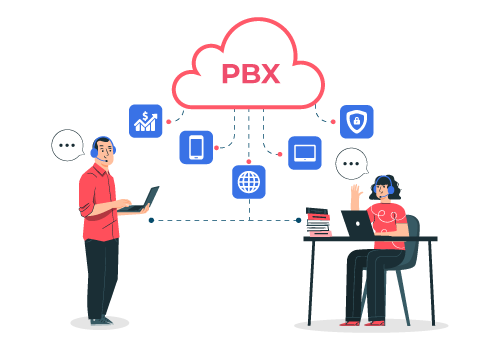
A PBX (Private Branch Exchange) phone system serves as an internal communication network within organizations. It manages incoming and outgoing phone calls, directing them to specific extensions or departments.
Essentially, it’s a centralized system that allows users within a company to communicate internally and externally via shared phone lines. PBX systems offer features like call routing, voicemail, conferencing, and more, enhancing communication efficiency.
They can be traditional hardware-based systems or modern cloud-based solutions, both aimed at streamlining and optimizing business communications while providing scalability and advanced functionalities.
Things To Consider for a PBX Phone System
PBX phone system serves the company’s current needs while remaining flexible enough to accommodate future growth. When choosing a PBX system, make sure to consider these factors to optimize communication, improve productivity, and support long-term objectives. 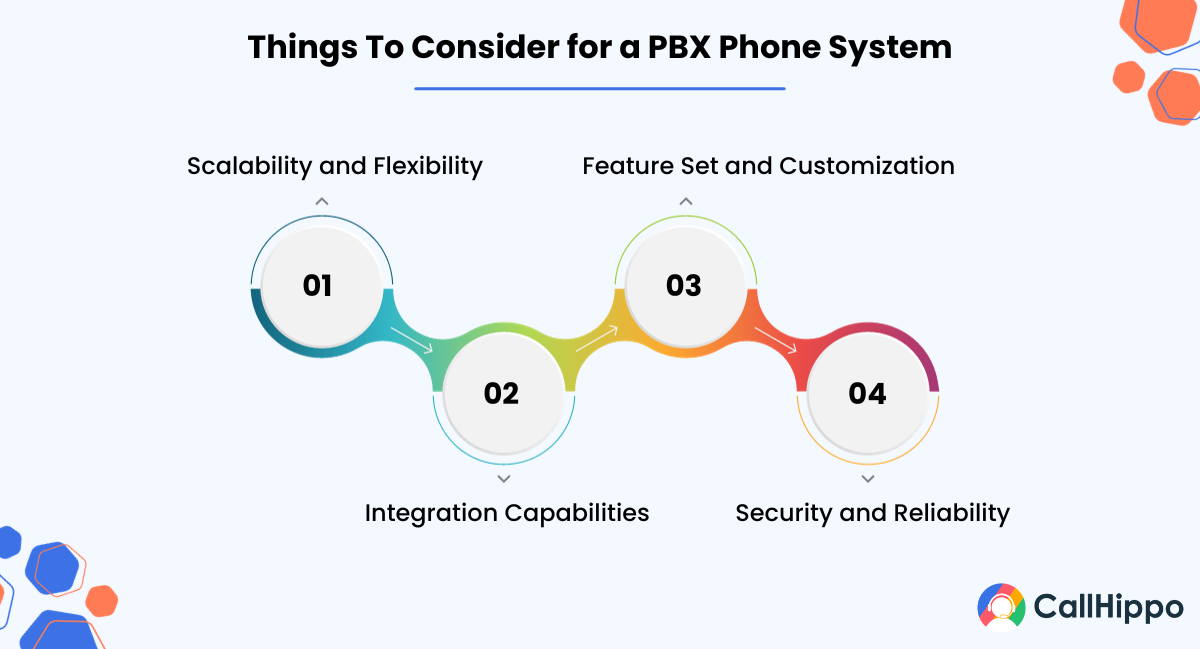
1. Scalability and Flexibility
A critical factor in choosing a PBX system is its scalability to accommodate business growth. Ensure the system can expand seamlessly with the company’s needs, allowing for additional lines, extensions, and features as the business expands. Flexibility is also key; the system should adapt to changes in call volume, seasonal fluctuations, and evolving communication requirements without compromising efficiency.
2. Feature Set and Customization
Evaluate the features offered by the PBX system and how well they align with business needs. Standard features like call forwarding, voicemail, auto-attendant, conferencing, and mobile integration are essential. Customization options are equally crucial; the ability to tailor settings, create personalized greetings, and modify call routing enhances the system’s usability and aligns it more closely with specific operational requirements.
3. Integration Capabilities
Consider the system’s compatibility and integration potential with other business tools and software. Seamless integration with CRM systems, helpdesk software, or collaboration platforms like Microsoft Teams or Slack can significantly improve productivity by enabling smoother data sharing, call tracking, and unified communication across various platforms.
4. Security and Reliability
Security measures are paramount when selecting a PBX system. Ensure the system implements robust security protocols to safeguard against potential threats like unauthorized access, data breaches, or service interruptions. Additionally, assess the system’s reliability by examining its uptime, redundancy features, and disaster recovery plans to guarantee uninterrupted communication even during unforeseen events or network issues.
PBX Phone System Prices
The PBX system price structure includes not only the initial setup but also ongoing expenses, which encompass maintenance, upgrades, and incorporation of additional features to enhance communication capabilities.
The price range overview of PBX Phone systems:
- Cloud-Based PBX: Cloud PBX solutions typically range from $20 to $50 per user per month, offering flexible subscription-based models tailored to business needs.
- On-Premise PBX: For on-premise systems, hardware costs vary widely, ranging between $1,000 to $5,000, and entail additional expenses for maintenance and support.
Businesses face the essential task of assessing their requirements comprehensively. Factors like scalability and the long-term cost implications of hosted PBX pricing need thorough evaluation before making an informed decision.
Comparing quotes from various providers, understanding contract terms, and considering potential future expansions or additional feature requirements become vital in aligning the chosen phone system with the organization’s budget and communication necessities.
Other Factors Influencing PBX Phone System Cost
Various factors impact the cost and these elements collectively influence the overall expenditure, extending beyond initial setup costs and shaping the total ownership expenses.
Let’s look at some of the key factors affecting PBX phone system cost 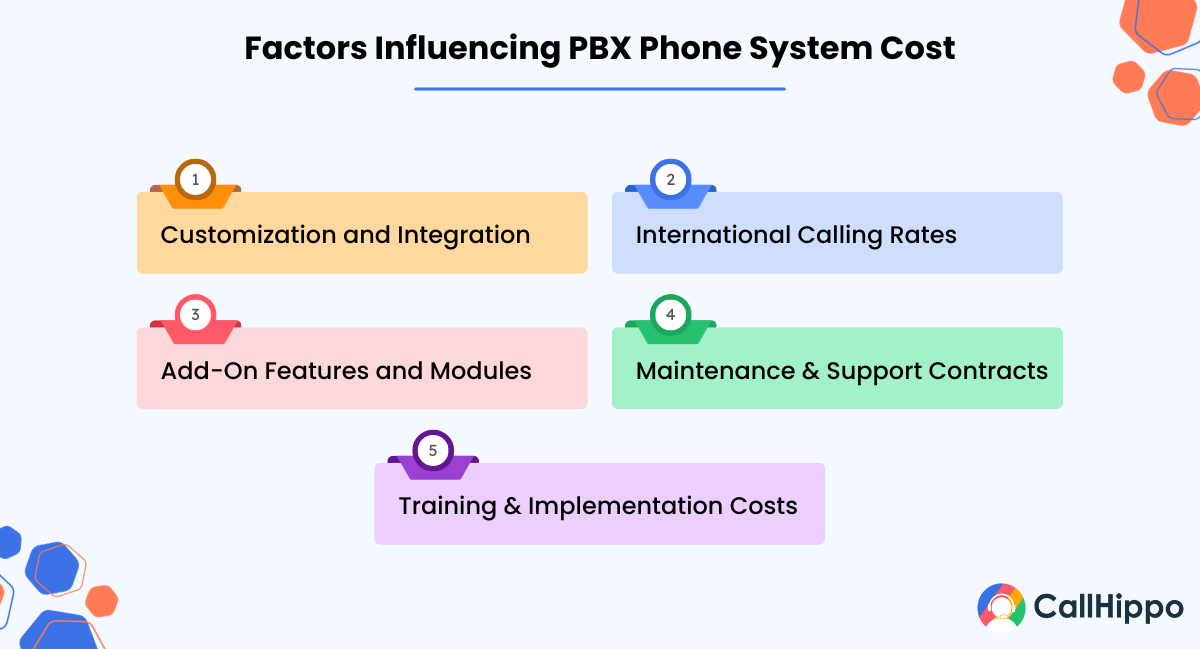
1. Customization and Integration
Tailoring a PBX phone system to match specific business needs incurs additional costs. Customizations often involve integrating the system with existing software or creating unique features, which can demand specialized development work and result in higher cloud pbx pricing.
2. International Calling Rates
When relying on a PBX system for international calls, it’s imperative to consider the rates set by your service provider for long-distance connections. Providers often impose differing rates based on countries, significantly affecting overall communication expenses for businesses leveraging the PBX system for international conversations.
3. Add-On Features and Modules
PBX systems often offer additional features beyond basic call management, such as call recording, advanced analytics, CRM integration, and mobile applications. Each extra feature or module added to the system may come at an additional cost, influencing the overall hosted PBX pricing structure.
4. Maintenance and Support Contracts
Ongoing maintenance, updates, and technical support play a crucial role in the smooth functioning of a PBX phone system. Some providers include these services in their packages, while others charge separately, affecting the total cost of ownership over time.
5. Training and Implementation Costs
Deploying a new PBX phone system might require employee training to ensure efficient utilization. Training programs, manuals, and implementation procedures can add to the overall expenses of adopting the system within an organization. Factors such as the complexity of the system and the scale of deployment can impact these costs.
5 Best PBX Phone Systems
Here are five leading PBX systems known for their diverse features, scalability, reliability, and ability to cater to different business sizes and needs. These systems offer a range of functionalities, from cloud-based flexibility to robust collaboration tools, ensuring seamless and efficient communication within organizations.
| Brand Name | Rating | Key Features | Pricing |
|---|---|---|---|
| CallHippo | Call forwarding Call recording Voicemail Text messaging | Basic: $0 Bronze: $16 /month Silver: $24 /month Platinum: $40 /month | |
| 3CX | Live chat Call management Remote Collaboration Call forwarding | Startup – Free Startup Pro – $175 Dedicated Pro – $295 Dedicated Enterprise – $330 | |
| RingCentral | Business phone or toll-free numbers Unlimited calling within the US and Canada Business SMS IVR | Core: $20 Advanced: $25 Ultra: $35 | |
| Nextiva | Auto attendant Hold music Mobile app and desktop app Video conferencing Audio-only conferencing Advanced IVR systems Caller ID | Essentials: $18.95 Professional: $22.95 Enterprise: $32.95 | |
| ooma | 24/7 customer service Offers more than 35 calling features Music on hold Call recording | Essentials Plan: $19.95 Pro Plan: $24.95 Pro Plus Plan: $29.95 |
After extensive research and analysis, we have curated a list of PBX Phone Systems. These softwares are carefully selected based on usability and satisfaction scores, including features, ease of use, customer support, ratings, and reviews from SoftwareSuggest, G2, and Capterra. Our aim is to assist businesses in identifying the most suitable software to streamline their operations.
1. CallHippo
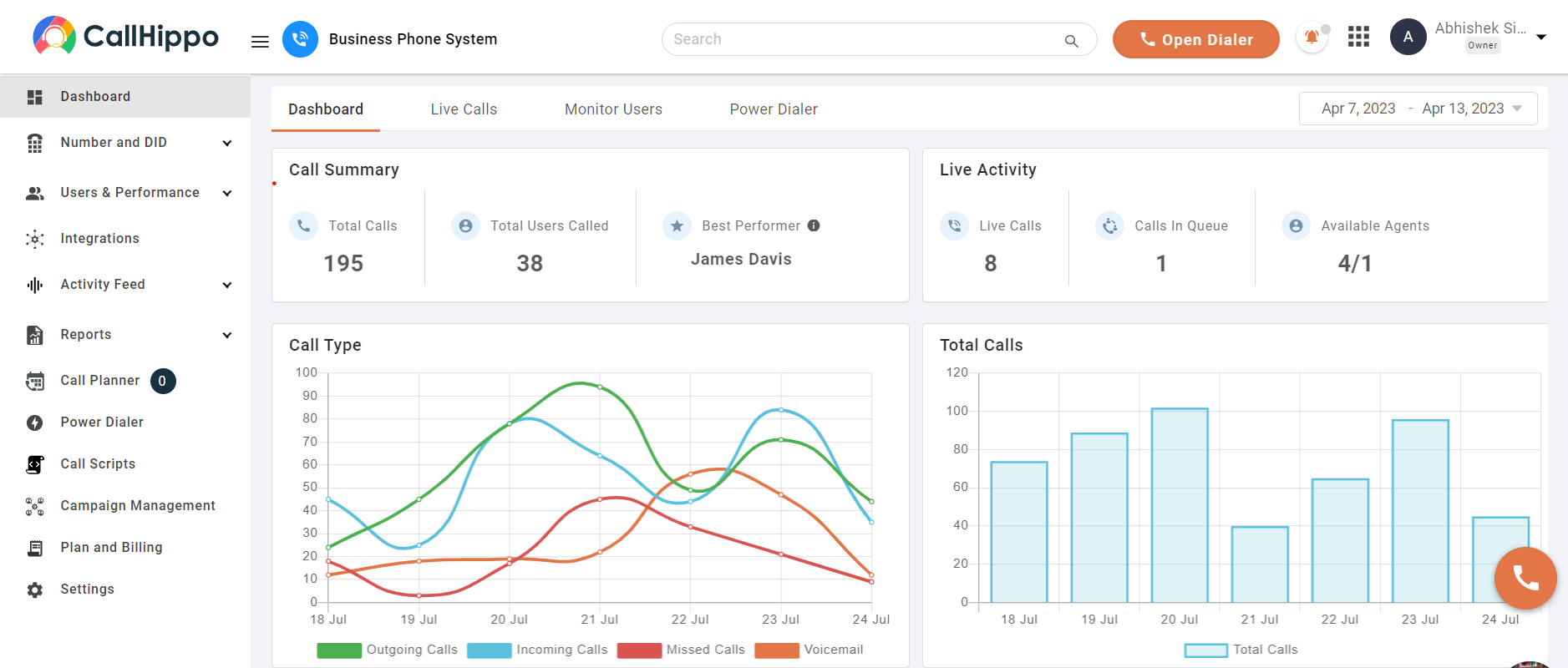 CallHippo offers a user-friendly virtual PBX phone system for growing teams. Its intuitive interface simplifies communication management, facilitating seamless connections across global networks. Noteworthy for robust CRM integration and customizable workflows, CallHippo optimizes operations, enhancing productivity within virtual PBX systems.
CallHippo offers a user-friendly virtual PBX phone system for growing teams. Its intuitive interface simplifies communication management, facilitating seamless connections across global networks. Noteworthy for robust CRM integration and customizable workflows, CallHippo optimizes operations, enhancing productivity within virtual PBX systems.
Key Features
- Global connect
- Call barging
- Smart switch
- Call routing
- Call queuing
Pros
- Cost-effective plans catering to diverse business sizes.
- Easy setup and user-friendly interface for quick adoption.
- Robust features enhancing communication efficiency and collaboration.
Cons
- Limited advanced features compared to some competitors.
- Occasional connectivity issues may disrupt seamless communication flow.
Pricing
- Starter – $18 Per user/Month
- Professional – $30 Per user/Month
- Ultimate – $42 Per user/Month
*Pricing as of 11-06-2024.
2. 3CX
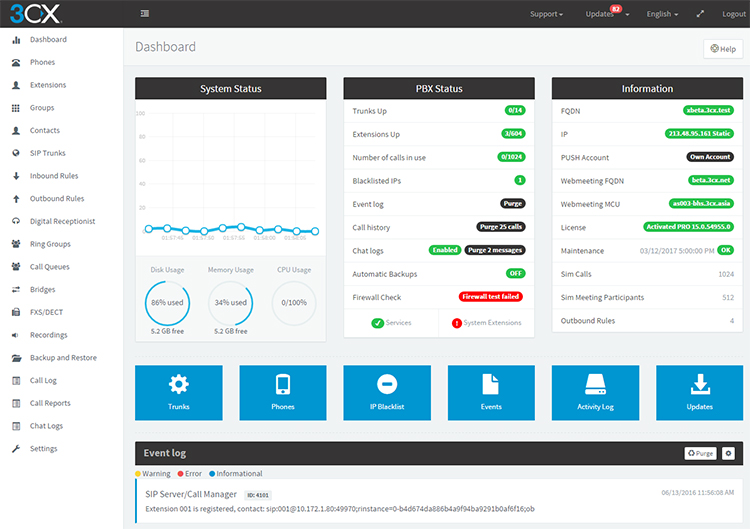 3CX stands out with its virtual PBX system, offering unified communications and comprehensive collaboration tools. Its robust platform integrates mobile compatibility and web conferencing, empowering businesses with seamless connectivity and efficient communication channels. The platform’s adaptability and extensive features cater to diverse business needs, offering a sophisticated phone system that enhances collaboration and fosters streamlined communication across various channels.
3CX stands out with its virtual PBX system, offering unified communications and comprehensive collaboration tools. Its robust platform integrates mobile compatibility and web conferencing, empowering businesses with seamless connectivity and efficient communication channels. The platform’s adaptability and extensive features cater to diverse business needs, offering a sophisticated phone system that enhances collaboration and fosters streamlined communication across various channels.
Key Features
- Call parking
- Auto attendant
- Multi-level IVR
- Voicemail transcription
Pros
- Extensive feature set catering to diverse communication needs.
- Flexible deployment options and scalability for growing businesses.
- Reliable performance ensures consistent communication reliability.
Cons
- Requires technical expertise for complex setup and advanced functionalities.
- Some features may demand a learning curve for efficient utilization.
Pricing
- 3CX Free – $0 forever (up to 10 users)
- 3CX SMB – $175 annually (per system, not user)
- 3CX Pro – $145 annually (per system, not user)
- 3CX ENT – $180 annually (per system, not user)
*Pricing as of 11-06-2024.
3. RingCentral
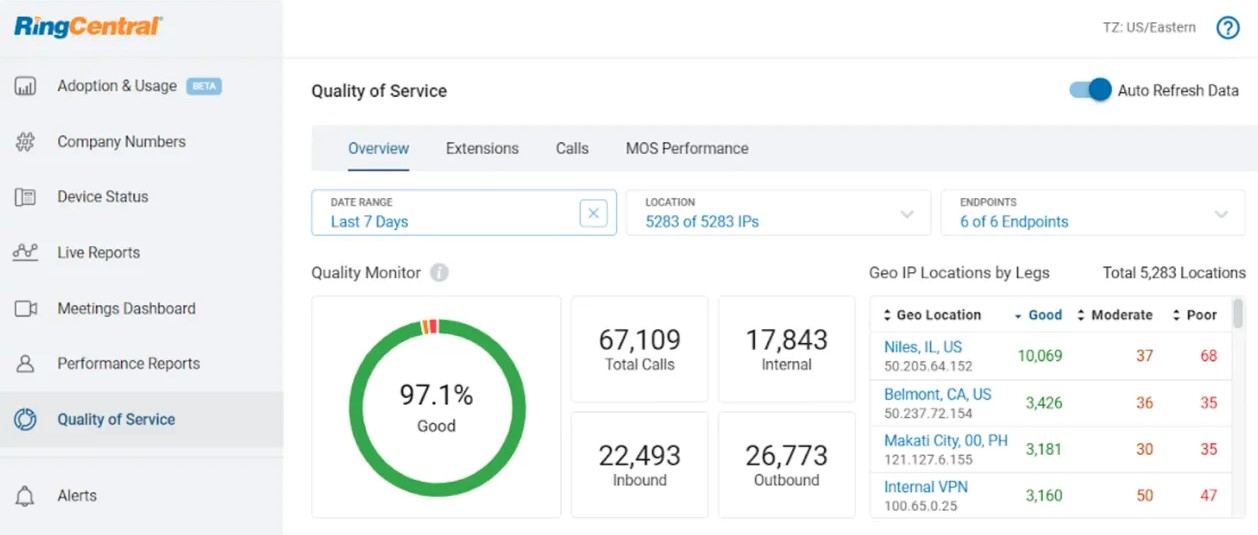 RingCentral boasts an all-encompassing suite, integrating messaging, video conferencing, and collaborative tools within its hosted PBX phone system. Its emphasis on comprehensive communication solutions and seamless integration empowers businesses with a unified platform for efficient collaboration and enhanced productivity. The hosted PBX system ensures a versatile communication framework, enabling businesses to streamline operations and facilitate seamless collaboration for improved productivity.
RingCentral boasts an all-encompassing suite, integrating messaging, video conferencing, and collaborative tools within its hosted PBX phone system. Its emphasis on comprehensive communication solutions and seamless integration empowers businesses with a unified platform for efficient collaboration and enhanced productivity. The hosted PBX system ensures a versatile communication framework, enabling businesses to streamline operations and facilitate seamless collaboration for improved productivity.
Key Features
- Visual voicemail
- Voicemail to email
- Vanity numbers
- Multiway conference call
Pros
- Offer interruption-free server uptime.
- Excellent customer support and service reliability.
- Seamless integration with mobile applications for enhanced accessibility.
Cons
- Higher pricing tiers might pose a challenge for budget-conscious businesses.
- Occasional service disruptions were reported affecting overall user experience.
Pricing
- Core – $20 per user per month
- Advanced – $25 per user per month
- Ultra – $35 per user per month
*Pricing as of 11-06-2024.
4. Nextiva
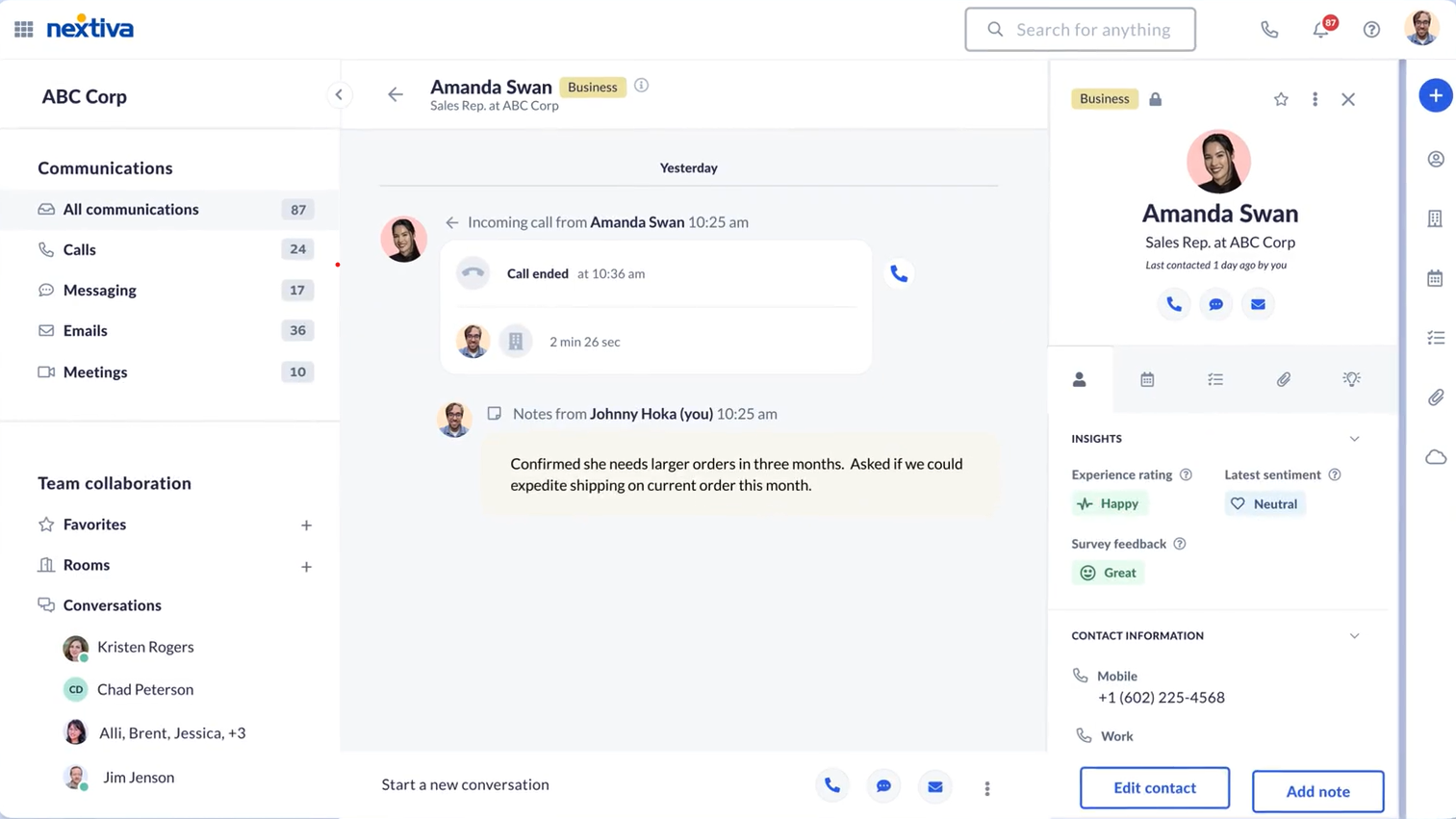 Nextiva stands as a robust hosted PBX phone system provider, focusing on customer service tools, analytics, and a wide array of add-on features. Its user-friendly interface, coupled with analytics-driven insights, ensures efficient communication management and empowers businesses with comprehensive tools for enhanced productivity.
Nextiva stands as a robust hosted PBX phone system provider, focusing on customer service tools, analytics, and a wide array of add-on features. Its user-friendly interface, coupled with analytics-driven insights, ensures efficient communication management and empowers businesses with comprehensive tools for enhanced productivity.
Key Features
- Call forwarding
- Call queuing
- Advance call routing
- Call analytics
Pros
- Excellent customer service support enriching the user experience.
- Analytics-driven insights aid in optimizing communication strategies.
- Intuitive interface ensuring ease of use for efficient communication management.
Cons
- Pricing may be on the higher side, especially for small businesses.
- Some features might require complex setups, impacting the ease of implementation for certain functionalities.
Pricing
- Essential – $18.95 per user per month
- Professional – $22.95 per user per month
- Enterprise – $32.95 per user per month
*Pricing as of 11-06-2024.
5. Ooma
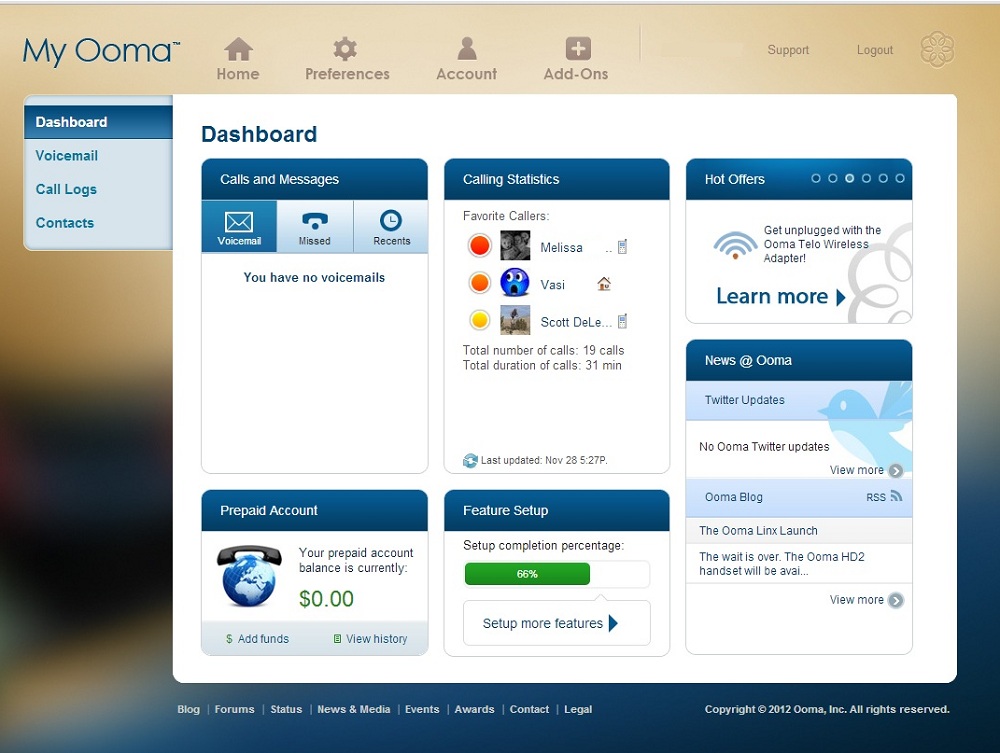 Ooma offers a budget-friendly PBX phone system solution emphasizing essential communication features for business phones such as call routing, voicemail, and conferencing. While focusing on cost-efficiency, it ensures reliable service delivery and simplified communication setups for businesses aiming for essential yet reliable communication tools. Ooma features list extends to all the classical features of traditional PBX systems plus advanced features made possible by voip services.
Ooma offers a budget-friendly PBX phone system solution emphasizing essential communication features for business phones such as call routing, voicemail, and conferencing. While focusing on cost-efficiency, it ensures reliable service delivery and simplified communication setups for businesses aiming for essential yet reliable communication tools. Ooma features list extends to all the classical features of traditional PBX systems plus advanced features made possible by voip services.
Key Features
- Call routing
- Voicemail
- Conferencing
- Call forwarding
Pros
- Cost-effective plans cater to businesses seeking essential communication features.
- A simple setup process ensures quick implementation.
- Reliable service providing consistent communication channels.
Cons
- Lacks advanced functionalities compared to competitors.
- Limited scalability options may hinder growth for expanding businesses.
Pricing
- Ooma telo white – $99.99
- Ooma telo air – $129.99
- Oomoa telo LTE – $19.99 per month + taxes and Ooma telo LTE ($129.99)
*Pricing as of 11-06-2024.
Conclusion
In summary, this guide provides a comprehensive understanding of PBX system, elucidating their core functionality and the factors influencing their costs. Highlighting key considerations like system types, hosted PBX pricing breakdowns, and the impact of customization and additional features, it aims to equip businesses with informed decision-making capabilities.
By exploring top PBX systems and their features while considering diverse cost elements such as international rates, ongoing maintenance costs, and compatibility with IP phones, this guide aids businesses in aligning their communication infrastructure needs with budgetary constraints effectively.
FAQs
1. How much does a cloud PBX system cost?
Virtual PBX pricing ranges from $20 to $50 per user per month, depending on features and service provider.
2. How much does a PBX server cost?
Traditional PBX systems or On-premise PBX costs can vary between $1,000 to $5,000 for hardware, plus installation and ongoing maintenance fees.
3. Is VoIP better than PBX?
VoIP operates within PBX systems and offers cost-efficiency, scalability, and flexibility compared to traditional PBX setups.
4. Do people still use PBX?
Yes, many businesses, especially larger enterprises, still rely on PBX systems due to their ability to manage internal and external communications efficiently over traditional phone lines.

Subscribe to our newsletter & never miss our latest news and promotions.









